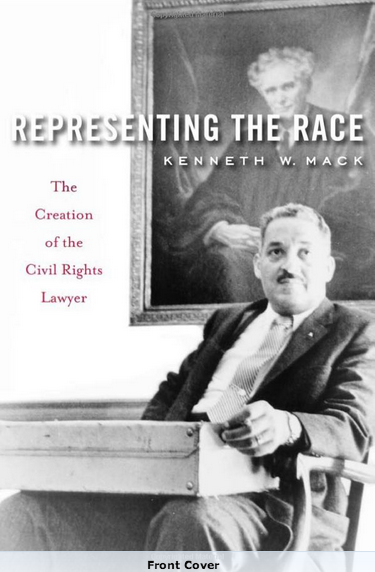
Richly compelling and impressively astute…Representing the Race examines the pre-Brown [v. Board of Education] world of black lawyers with a perceptive, critical thoughtfulness that sets Mack’s work above all previous treatments. By eschewing celebratory homage in favor of tough-minded honesty, he addresses the hardest questions about representativeness and “racial authenticity” with an acuity and freshness that resonate forward to the present day…Representing the Race will be a prize-winning book that profoundly alters and improves our understanding of civil rights history. (David J. Garrow, Washington Post)
[A]mong Mack’s many virtues as a writer is his power of empathetic identification. Again and again, he captures the dilemmas of the figures he studies as they experience the competing demands of performing in the role of representative African American, on the one hand, and of lawyer in a society in which this position has traditionally been reserved for whites only, on the other. . . Representing the Race is a narrative tour de force. (Law and Social Inquiry)
[Representing the Race] is a strikingly humane work of legal history. . . These people are not just leaders in the civil rights struggle, they are lawyers, and by more fully situating them within the black bar, Mack emphasizes the professional ties and demands that link black lawyers. . . . It was often in the day-to-day life of the practicing lawyer that the dilemma of representation played out. (Law and History Review)
Provide[s] the promising opportunity . . . to look backward and ahead in order to help steer the next generation of civil rights lawyers. (Yale Law Journal)
Representing the Race is a masterful, compelling, and important book. Mack writes in vivid, memorable prose, and he artfully narrates stories that illuminate his themes in complex yet clear terms. It is a good read. (Michael McCann, Tulsa Law Review)
Mack’s collective biography of early black attorneys is an important contribution to the host of new and innovative works in the last decade that have broadened the scope, nature, and sophistication of the study of the civil rights movement…Mack includes but moves beyond icons such as Charles Houston, William Hastie, and Thurgood Marshall to lesser-known attorneys who fought for clients in cases that will never receive historical attention. These groundbreakers struggled to establish their identity as professional attorneys within the legal community, courtroom, and larger society. They maintained a delicate balance among their racial identity, position in the black community, and larger legal standing. The experiences of the featured attorneys are fascinating, and they make readers hunger for stories of the hundreds of other Jim Crow-era black attorneys. (J. P. Dunn, Choice)
This group of pioneering lawyers didn’t just help break boundaries, but also, as Mack so adeptly shows, their own stories do not fit the easy narratives we may expect from our civil rights leaders…These men and women achieved important victories whose impact continues to resonate. (Andrew Losowsky, Huffington Post)
The book provides a wealth of interesting details about how black men and women lawyers persevered in the face of stupendous obstacles to help bring about major progress toward racial equality. . . Issues of exemplary representatives versus authentic representatives have been back in the spotlight during President Obama’s presidency. Some have asked if Barack Obama is really black, or is black enough. In Mack’s terms the question could be rephrased as, is Obama simply an “exemplary representative” of the race without being an “authentic representative”?. (Law and Politics Book Review)
Mack paints a fascinating picture of black lawyers struggling to find a place for themselves in the legal profession. (Harvard Law Review)
Mack calls himself an historian, and his book has all the elements of a good work of history—a strong story, memorable personalities, and intriguing rivalries, all built on extensive and compelling research. And reflecting the book’s focus on the law, it also contains wonderful courtroom scenes. We hope you’ll find Representing the Race as interesting and provocative as we do. (Lissa Muscatine & Bradley Graham, Politics and Prose)
